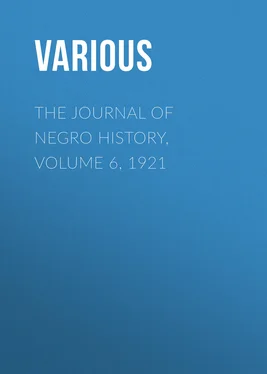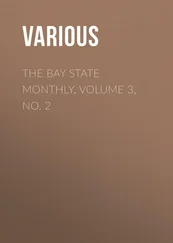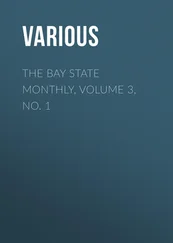Various - The Journal of Negro History, Volume 6, 1921
Здесь есть возможность читать онлайн «Various - The Journal of Negro History, Volume 6, 1921» — ознакомительный отрывок электронной книги совершенно бесплатно, а после прочтения отрывка купить полную версию. В некоторых случаях можно слушать аудио, скачать через торрент в формате fb2 и присутствует краткое содержание. Жанр: foreign_antique, periodic, История, foreign_edu, на английском языке. Описание произведения, (предисловие) а так же отзывы посетителей доступны на портале библиотеки ЛибКат.
- Название:The Journal of Negro History, Volume 6, 1921
- Автор:
- Жанр:
- Год:неизвестен
- ISBN:нет данных
- Рейтинг книги:4 / 5. Голосов: 1
-
Избранное:Добавить в избранное
- Отзывы:
-
Ваша оценка:
- 80
- 1
- 2
- 3
- 4
- 5
The Journal of Negro History, Volume 6, 1921: краткое содержание, описание и аннотация
Предлагаем к чтению аннотацию, описание, краткое содержание или предисловие (зависит от того, что написал сам автор книги «The Journal of Negro History, Volume 6, 1921»). Если вы не нашли необходимую информацию о книге — напишите в комментариях, мы постараемся отыскать её.
The Journal of Negro History, Volume 6, 1921 — читать онлайн ознакомительный отрывок
Ниже представлен текст книги, разбитый по страницам. Система сохранения места последней прочитанной страницы, позволяет с удобством читать онлайн бесплатно книгу «The Journal of Negro History, Volume 6, 1921», без необходимости каждый раз заново искать на чём Вы остановились. Поставьте закладку, и сможете в любой момент перейти на страницу, на которой закончили чтение.
Интервал:
Закладка:
On the whole, the aggregate sum needed may be stated at about six hundred millions of dollars.
This will require 200 millions of acres, at three dollars per acre; or 300 millions at two dollars per acre; a quantity which, though great in itself, is perhaps not a third part of the disposable territory belonging to the United States. And to what object so good, so great, and so glorious, could that peculiar fund of wealth be appropriated? Whilst the sale of territory would, on one hand, be planting one desert with a free and civilized people, it would, on the other, be giving freedom to another people, and filling with them another desert. And if in any instance wrong has been done by our forefathers to people of one colour, by dispossessing them of their soil, what better atonement is now in our power than that of making what is rightfully acquired a source of justice and of blessings to a people of another colour?
As the revolution to be produced in the condition of the negroes must be gradual, it will suffice if the sale of territory keep pace with its progress. For a time, at least, the proceeds would be in advance. In this case, it might be best, after deducting the expense incident to the surveys and sales, to place the surplus in a situation where its increase might correspond with the natural increase of the unpurchased slaves. Should the proceeds at any time fall short of the calls for their application, anticipations might be made by temporary loans, to be discharged as the land should find a market.
But it is probable that for a considerable period the sales would exceed the calls. Masters would not be willing to strip their plantations and farms of their labourers so rapidly. The slaves themselves connected, as they generally are, by tender ties with others under other masters, would be kept from the list of emigrants by the want of the multiplied consents to be obtained. It is probable, indeed, that for a long time a certain portion of the proceeds might safely continue applicable to the discharge of the debts or to other purposes of the nation, or it might be most convenient, in the outset, to appropriate a certain proportion only of the income from sales to the object in view, leaving the residue otherwise applicable.
Should any plan similar to that I have sketched be deemed eligible in itself, no particular difficulty is foreseen from that portion of the nation, which, with a common interest in the vacant territory, has no interest in slave property. They are too just to wish that a partial sacrifice should be made for the general good, and too well aware that whatever may be the intrinsic character of that description of property, it is one known to the Constitution, and, as such could not be constitutionally taken away without just compensation. That part of the nation has, indeed, shewn a meritorious alacrity in promoting, by pecuniary contributions, the limited scheme for colonizing the blacks, and freeing the nation from the unfortunate stain on it, which justifies the belief that any enlargement of the scheme, if founded on just principles, would find among them its earliest and warmest patrons. It ought to have great weight that the vacant lands in question have, for the most part, been derived from grants of the States holding the slaves to be redeemed and removed by the sale of them.
It is evident, however, that in effectuating a general emancipation of slaves in the mode which has been hinted, difficulties of other sorts would be encountered. The provision for ascertaining the joint consent of the masters and slaves; for guarding against unreasonable valuations of the latter; and for the discrimination of those not proper to be conveyed to a foreign residence, or who ought to remain a charge on masters in whose service they had been disabled or worn out, and for the annual transportation of such numbers, would require the mature deliberations of the national councils. The measure implies also, the practicability of procuring in Africa an enlargement of the district or districts for receiving the exiles sufficient for so great an augmentation of their numbers.
Perhaps the Legislative provision best adapted to the case would be an incorporation of the Colonizing Society, or the establishment of a similar one, with proper powers, under the appointment and superintendence of the National Executive.
In estimating the difficulties, however, incident to any plan of general emancipation, they ought to be brought into comparison with those inseparable from other plans, and be yielded to or not accordingly to the result of the comparison.
One difficulty presents itself which will probably attend every plan which is to go into effect under the Legislative provisions of the National Government. But whatever may be the effect of existing powers of Congress, the Constitution has pointed out the way in which it can be supplied. And it can hardly be doubted that the requisite powers might readily be procured for attaining the great object in question, in any mode whatever approved by the nation.
If these thoughts can be of any aid in your search of a remedy for the great evil under which the nation labors, you are very welcome to them. 111 111 Letters and other Writings of James Madison , III, 133-138.
To Tench Coxe.
Montpelier, March 20, 1820.I am glad to find you still sparing moments for subjects interesting to the public welfare. The remarks on the thorny one to which you refer in the "National Recorder," seem to present the best arrangement for the unfortunate part of our population whose case has enlisted the anxiety of so many benevolent minds, next to that which provides a foreign outlet and location for them. I have long thought that our vacant territory was the resource which, in some mode or other, was most applicable and adequate as a gradual cure for the portentous evil; without, however, being unaware that even that would encounter serious difficulties of different sorts. 112 112 Ibid. , III, 170.
To General Lafayette.
Montpelier, Nov. 25, 1820.The subject which ruffles the surface of public affairs most, at present, is furnished by the transmission of the "Territory" of Missouri from a state of nonage to a maturity for self-Government, and for a membership in the Union. Among the questions involved in it, the one most immediately interesting to humanity is the question whether a toleration or prohibition of slavery Westward of the Mississippi would most extend its evils. The human part of the argument against the prohibition turns on the position, that whilst the importation of slaves from abroad is precluded, a diffusion of those in the Country tends at once to meliorate their actual condition, and to facilitate their eventual emancipation. Unfortunately, the subject, which was settled at the last session of Congress by a mutual concession of the parties, is reproduced on the arena by a clause in the Constitution of Missouri, distinguishing between free persons of colour and white persons, and providing that the Legislature of the new State shall exclude from it the former. What will be the issue of the revived discussion is yet to be seen. The case opens the wider field, as the Constitution and laws of the different States are much at variance in the civic character giving to free persons of colour; those of most of the States, not excepting such as have abolished slavery, imposing various disqualifications, which degrade them from the rank and rights of white persons. All these perplexities develope more and more the dreadful fruitfulness of the original sin of the African trade. 113 113 Letters and other Writings of James Madison , III, 190.
To F. Corbin
November 26, 1820.I do not mean to discuss the question how far slavery and farming are incompatible. Our opinions agree as to the evil, moral, political, and economical, of the former. I still think, notwithstanding, that under all the disadvantages of slave cultivation, much improvement in it is practicable. Proofs are annually taking place within my own sphere of observation; particularly where slaves are held in small numbers, by good masters and managers. As to the very wealthy proprietors, much less is to be said. But after all, (protesting against any inference of a disposition to undertake the evil of slavery,) is it certain that in giving to your wealth a new investment, you would be altogether freed from the cares and vexations incident to the shape it now has? If converted into paper, you already feel some of the contingencies belonging to it; if into commercial stock, look at the wrecks every where giving warning of the danger. If into large landed property, where there are no slaves, will you cultivate it yourself? Then beware of the difficulty of procuring faithful or complying labourers. Will you dispose of it in leases? Ask those who have made the experiment what sort of tenants are to be found where an ownership of the soil is so attainable. It has been said that America is a country for the poor, not for the rich. There would be more correctness in saying it is the country for both, where the latter have a relish for free government; but, proportionally, more for the former than for the latter. 114 114 Letters and other Writings of James Madison , III, 193-194.
Интервал:
Закладка:
Похожие книги на «The Journal of Negro History, Volume 6, 1921»
Представляем Вашему вниманию похожие книги на «The Journal of Negro History, Volume 6, 1921» списком для выбора. Мы отобрали схожую по названию и смыслу литературу в надежде предоставить читателям больше вариантов отыскать новые, интересные, ещё непрочитанные произведения.
Обсуждение, отзывы о книге «The Journal of Negro History, Volume 6, 1921» и просто собственные мнения читателей. Оставьте ваши комментарии, напишите, что Вы думаете о произведении, его смысле или главных героях. Укажите что конкретно понравилось, а что нет, и почему Вы так считаете.












